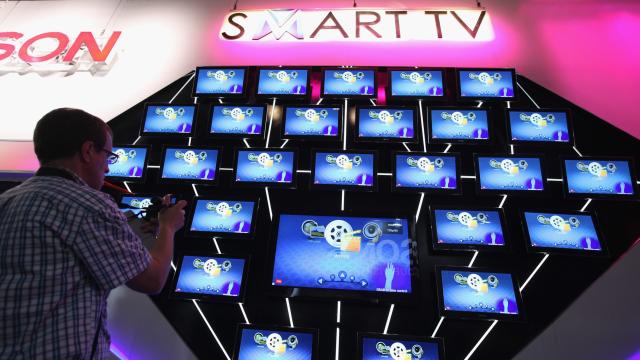A visitor looks at a display of Smart TV televisions at the Thomson stand at the IFA 2011 consumer electonics and appliances trade fair on the first day of the fair’s official opening on September 2, 2011 in Berlin, Germany.
Two US senators have some suspicions about smart TVs, and they’re asking the Federal Trade Commission to look into the data collection practices employed by TV manufacturers to see if the internet-connected devices are quietly sucking up information from unwitting consumers.
Democrats Ed Markey of Massachusetts and Richard Blumenthal of Connecticut signed on to a letter sent this week to FTC head Joseph Simons, asking the agency to start digging into the privacy policies and practices of companies to look for any sort of attempts to track user activity. The FTC confirmed to Ars Technica that it received the letter, but didn’t comment on any action being taken.
What prompted the senators’ interest in the potentially invasive practices of smart TVs was a recent report from the New York Times that focused on Samba TV, a company that makes software to track viewer information. While the service provides users with personalised show recommendations, it doesn’t provide much disclosure regarding what it records in order to produce those suggestions.
Per the New York Times, Samba has deals with about one dozen TV manufacturers including Sony, Sharp, TCL, and Philips — all of which have the Samba software installed on their smart TV sets. The company has reportedly amassed viewing data from at least 13.5 million TVs in the US, mostly done by reviewing pixels on the screen to determine what is on the screen — from TV shows to streaming content to video games. Where things get even weirder is the fact Samba can also determine other devices set up on the same internet connection as the TV.
The catch with Samba is the same catch with any data-collecting firm: The information recorded and stashed by the company isn’t just used for improving the user’s experience, It’s also used to attract advertisers, as viewing habits and screen time provide some good indicators for targeted ads. Samba doesn’t sell its data directly to other companies, according to the Times, but does offer to direct ads to certain segments of consumers for advertisers — including sending ads to other devices in the home in response to an ad that plays on your TV.
Set Samba aside and there are still plenty of privacy concerns surrounding smart TVs. Last year, TV maker Vizio got hit with a sizable fine from the FTC after it was discovered the company was tracking the second-by-second viewing activity on its smart TVs without making that fact explicitly clear to consumers. Then there’s the other bells and whistles included on smart TVs that suck up data. Back in 2015, Samsung got accused of collecting personal and sensitive information through microphones meant to enable voice control features.
All of these situations boil down to a lack of sufficient disclosure making the user aware in clear terms what is being collected and why. Some might argue that consumers should just assume if they are being tracked in some form if they are using a device that is connected to the internet, but Senators Markey and Blumenthal believe we should still expect at least some semblance of privacy in our lives:
Televisions have entered a new era, but that does not mean that users’ sensitive information no longer deserves protection. The content consumers watch is private, and it should not be assumed that customers want companies to track and use information on their viewing habits.
Given the prominence of smart TVs — there’s one in 45 per cent of US households, according to data from IHS Markit — it’s probably about time for the FTC to start doing some digging on just what kind of information companies are collecting through the internet-connected sets and what they are doing with it.
